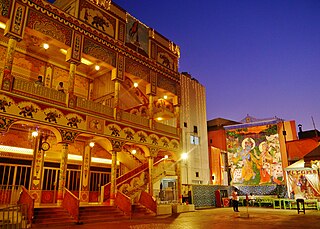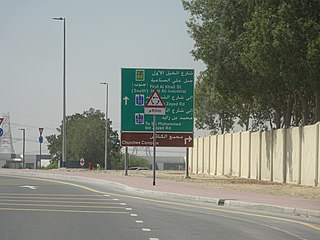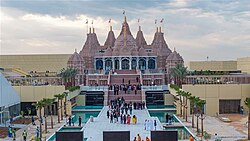This article covers the various forms of transport in the United Arab Emirates (UAE), by road, rail, air, water, etc.

The United Arab Emirates (UAE), or simply the Emirates, is a country in West Asia, in the Middle East. It is located at the eastern end of the Arabian Peninsula and shares borders with Oman and Saudi Arabia, while also having maritime borders in the Persian Gulf with Qatar and Iran. Abu Dhabi is the country's capital, while Dubai, the most populous city, is an international hub.

Sheikh Rashid bin Saeed Al Maktoum was an Emirati royal, politician and a founder of the United Arab Emirates. Al Maktoum was the first vice president and second prime minister of the United Arab Emirates, and was the ruler of Dubai. He ruled Dubai for 32 years from 1958 until his death in 1990. He was the vice president from the founding of the UAE until his death. Al Maktoum was the first vice president to serve as prime minister concurrently, when he became prime minister on 30 April 1979. Every prime minister after him was de facto also vice president.

Hinduism has been found in the Middle East since the early 16th century. Millions of members of the Indian diaspora, of different religions, reside and work in Arab states of the Persian Gulf; many of them are Hindu. Many came due to the migration of Indians and Nepalese expatriates and employees to the area around the Persian Gulf.
The Constitution of the United Arab Emirates provides for freedom of religion by established customs, and the government generally respects this right in practice; however, there are some restrictions. The federal Constitution declares that Islam is the official religion of the country. The Government confirmed it illegal to convert from Islam and leaving the Islamic faith is considered apostasy, a crime punishable by death.

The Emiratis are the native citizen population of the United Arab Emirates. Within the UAE itself, they number approximately 1.15 million.
The Dubai Hindu Temple is a place of worship for Hindus in Dubai, United Arab Emirates (UAE). The temple caters to the large Hindu community in the United Arab Emirates. The temple complex, initially established in 1958 in Bur Dubai, comprised the Shiva Mandir, Krishna Mandir, and Gurudwara.
Mass media in the United Arab Emirates is subject to government control and censorship. Media freedom is severely curtailed in the UAE. Most UAE media is owned by the government or by groups that have ties to the government. UAE law permits the government to censor content critical of the government. Journalists and writers who criticize the government are subject to repression.
Indians in the United Arab Emirates constitute the largest part of the population of the country. Over 3,860,000 Indian expats are estimated to be living in the UAE, which is over 38 percent of the total population of the UAE and the fourth highest number of overseas Indian people in the world, after the United States, Saudi Arabia and Nepal. Indian contact with the emirates that now constitute the UAE dates back several centuries, as a result of trade and commerce between the emirates and India. The UAE has experienced a tremendous increase in the population of resident Indians who initially migrated to the country as a result of opportunities in petroleum. Now, Indians are key to the UAE's construction, retail, financial services, healthcare, manufacturing and transport sectors. A sizeable minority of Indian migrants are involved in professional services and entrepreneurship. Relations between India and the UAE have traditionally been very friendly.

According to the 2005 census, Christians accounted for 9 percent of the total population of the United Arab Emirates; estimates in 2010 suggested a figure of 12.6%.

Jebel Ali Village (JAV) is a neighbourhood in Jebel Ali, southern Dubai, United Arab Emirates. Now it is a redevelopment by Nakheel Properties of the existing Jebel Ali Village. Churches Complex of Jebel Ali is located here.

India–United Arab Emirates relations are the bilateral relations that exist between the Republic of India and the United Arab Emirates. Since 3000 B.C., India and the UAE, including its precursor emirates, had close relations with ancient trade networks. Sumerians traded with Meluhha, Magan, and Dilmun (Bahrain), connecting through the UAE. Maritime routes facilitated Arab trade with India for silk, spices, gold, and porcelain. Sumerians traded with Meluhha, Magan, and Dilmun (Bahrain), connecting through the UAE. Maritime routes facilitated Arab trade with India for silk, spices, gold, and porcelain. Post-1971, India-UAE relations strengthened politically, economically, and culturally.

Sikhism in the United Arab Emirates has a following of over 50,000; the majority of Sikhs in the UAE can be found in Dubai, Abu Dhabi or Sharjah.
Islam is both the majority and official religion in the United Arab Emirates, professed by approximately 76% of the population.The Al Nahyan and Al Maktoum ruling families adhere to Sunni Islam of Maliki school of jurisprudence. Many followers Hanbali school of Sunni Islam are found in Sharjah, Umm al-Quwain, Ras al-Khaimah and Ajman. Their followers include the Al Qasimi ruling family. Other religions represented in the country including Christianity, Hinduism, Buddhism, Zoroastrians, Druze, Baha'i, Judaism, and Sikhism are practiced by non-nationals.

The BAPS Hindu Mandir Abu Dhabi in the UAE, is a traditional Hindu mandir built by the BAPS Swaminarayan Sanstha. Inspired by Pramukh Swami Maharaj (1921–2016) and consecrated by Mahant Swami Maharaj on 14 February 2024, this is the first traditional Hindu mandir in Abu Dhabi.

Shrinathji Temple is a heritage Hindu temple in Manama established in the year 1817. The temple is dedicated to Lord Shrinathji, a form of Krishna, manifested as a seven-year-old child. The temple is located in the Bahrain's capital city of Manama.

The Churches Complex in Jebel Ali Village, Dubai, United Arab Emirates, is an area for a number of churches and temples of different religious denominations, especially Christian denominations. It is located immediately to south of the Al Muntazah residential neighbourhood complex.
Events in the year 2022 in the United Arab Emirates.
Events in the year 2024 in the United Arab Emirates.











